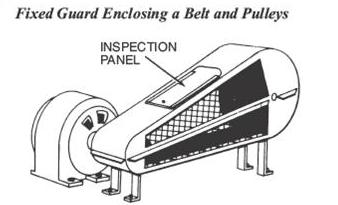Guard design and material will vary from machine to machine and from tool to tool.
Types of machine guarding.
Properly trained operators should be the only ones to use adjustable guards.
These different types of hazardous mechanical motions and actions are basic in varying combinations to nearly all machines and recognizing them is the first step toward protecting workers from the danger they present.
Guards these are physical barriers that prevent contact.
You should try to have these before any other types of machine guarding.
Fixed guards are permanently attached to the machine or tool don t have any moving parts and can t be moved while the machine is in use.
The basic types of hazardous mechanical motions and actions are.
There are five 5 general types of machine safeguards that can be used to protect workers and personnel in the immediate vicinity of machinery.
However many people do not realise that such guards can then be sub divided into three different types which i call immediate local and perimeter.
Types of machine guarding.
I m sure that most people are aware of the puwer requirements on machine guarding putting fixed guards foremost and then interlocked guards.
Interlock guards make certain that the machine cannot be started until the guard screen is in the closed position and conversely the guard cannot be removed until the working parts have been stopped.
Mechanical electrical hydraulic or pneumatic systems are used to actuate the guard.
Nip guard to in running rolls and fixed railing or fencing to engines motors planning or shaping machine are of this type.
Fixed guards cannot be removed easily without the use of tools.
Rotating including in running nip points reciprocating.
They can be fixed interlocked adjustable or self adjusting.
They re most often used to enclose the point of operation or other hazards that the operator doesn t need to interact with like.

